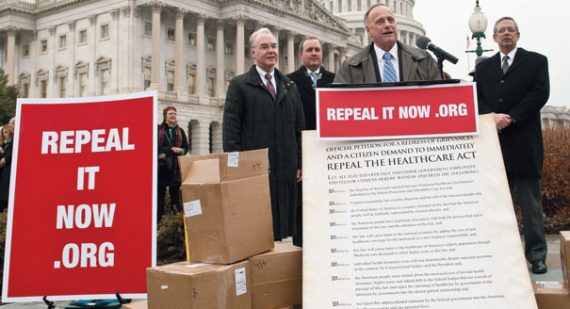So Much For “Repeal And Replace”
Whatever happened to the GOP's promise to "repeal and replace" the Affordable Care Act?
Politico notes that the Republican health care agenda of “repeal and replace” is pretty much dead:
House Republicans haven’t held a floor vote on a bill or amendment trying to repeal, defund or even nick the law for six weeks, after a dozen attempts earlier this year. The stream of committee hearings to pick apart the law’s policies — held back-to-back-to-back earlier this year — has slowed to a trickle.
And not a single element of their “replace” agenda has gotten a House floor vote.
Senate Republicans — who made similar pledges to fight the Democratic majority to try to defeat the law — haven’t had much luck either. Republicans haven’t been able to force a vote on any proposal against the health plan since failed attempts to defund the law and Planned Parenthood in mid-April.
For all of their promises to do everything they can to stop the law, the only thing Republicans have been able to get to President Barack Obama’s desk is the bill to eliminate the requirement that businesses file 1099 tax reporting requirements.
None of this is entirely surprising. As I noted at the beginning of the year, there was simply no way that repeal of the Affordable Care Act was going to get any further than a party line vote in the House. The one provision that has been repealed, the 1099 reporting requirement, was widely derided on both sides of the aisle and its repeal had bipartisan support. The rest of the GOP health care agenda, though, ran up against cold hard reality:
Privately, Republicans cite a combination of factors as to why the health activity has slowed down. Other issues have come up, including the debt limit and military activity in Libya. Some question whether holding a vote now on the law’s most unpopular provision — the individual mandate— would undermine the various lawsuits against it, or would be more politically useful closer to the November 2012 election.
But there are also signs that House GOP leadership has grown weary of fighting an uphill battle on the issue. One possible reason for the fatigue factor: All but one of the repeal laws they’ve passed this year have died in the Senate.
Rep. Steve King (R-Iowa), one of the House’s most ardent supporters of repealing or defunding the law at all costs, says it has become more difficult to get the attention of House leaders.
“I can’t get any traction,” he said of his effort to repeal or defund the law. “You can’t create something in this Congress unless leadership approves it.”
He questioned whether Republican leaders are willing to repeal the whole law if it means also repealing some of its popular provisions.
“There’s a little bit of an undercurrent that I pick up among well-positioned people in this Congress who think there could be some redeeming qualities of Obamacare,” pointing to statements Republican leadership have made in support of a handful of the law’s policies, such as banning insurers from denying patients because of preexisting conditions or allowing children to remain on their parents’ insurance through age 26.
In other words, it might not be smart politics for Republicans to head into the 2012 Congressional elections with a vote on their record that is purely symbolic and could be spun against them. Additionally, while the health care reform plan remains highly unpopular in the polls, the public is more sharply divided on the question of repeal. But all of that is largely irrelevant next to the simple fact that there are really only two ways that the Affordable Care Act is repealed. Either the Supreme Court ultimately strikes the law down as unconstitutional, or the GOP wins both the White House and a sufficient majority in the Senate in 2012 to permit it to push through a repeal bill in 2013. Both of those strike me as long shots.
Honestly, I always thought that the entire “repeal and replace” mantra was nothing more than a sop from the GOP to the Tea Party crowd, dressed up in a way to make it acceptable to the public. Rather than just saying they were going to repeal a law that contains some provisions that are politically popular — such as the ban on denial of insurance to people with pre-existing conditions — the GOP could tell the public that what they really were going to do was replace ObamaCare with something better. The fact that there was never any chance that such legislation could make it through Congress unless the GOP controlled both branches, and that it would never survive a Presidential veto, was glossed over. All that mattered was that they said they would repeal Obamacare.
The most important factor in all of this, though, is the fact that the GOP victories in November 2010 had nothing to do with repealing the health care law, and everything to do with the economy:
The results underscored the economic distress defining the 2010 election. Eighty-nine percent of voters said the national economy’s in bad shape — nearly as many as the record 92 percent who said so two years ago. What changed is the direction of their ire: In 2008, 54 percent of such voters favored Barack Obama. This year, 55 percent backed Republicans for the House.
(…)
Compounding the political impact of the long downturn, 87 percent remain worried about the economy’s direction in the next year — including half “very” worried. They voted more than 2-1 for Republicans this year, 70-28 percent.
The economy has deeply affected the broader public mood. Sixty-one percent in the national exit poll said the country’s headed seriously off on the wrong track; they supported Republicans by 75-23 percent. More broadly, 38 percent said they expect life for the next generation of Americans to be worse than it is today, vs. 32 percent better — a negative balance on one aspect of the American dream.
(…)
Exit polls have had varying “most important issues” lists since 1992 with “the economy” as an issue. This year, 62 percent of voters picked it as the single most important issue in their vote — and they voted 53-44 percent for Republicans for House. It was the first time economy voters favored Republicans.
Only 19% of voters in November 2010 said that health care was an influence on their vote. So, the idea that the GOP won any kind of a mandate on this issue is simply false. The less time they spend on it, the less time they appear to be ignoring the issues that matter to the voters who sent them to Washington.
The GOP can choose to make repeal of the PPACA, and the Ryan Plan’s Medicare changes, an issue in 2012, and perhaps they should. However given recent polling I’m not sure they’d get an enthusiastic reception from the public.
Photo via Politico






Based on how the ACRA was passed, I’m thinking that a majority of one would suffice.
What have the Congressional Republicans been up to this year?
Other than their nihilistic attempts to destroy America’s economy, that is.
Have they done anything?
Well, I think any sane person understands that our government, and probably any nominally “free” government anywhere, functions on compromise, no matter the merits of the underlying idea people are compromising on.
It’s clear that one of the main reasons our current gov’t is so completely jacked-up is that the TeaTards* sent in their chosen people cursing the very word ‘compromise’ – whatever each politician’s (ore even individual voter’s) chosen issue de jour, they will accept no compromise on that, and they really don’t care what happens to any other aspect of ‘big-A’ America to get it.
*: I use that derogatory term to underline the fact that, despite their loud protestations of Original Constitutional/Founding Father loyalty uber alles, they really don’t have any idea at all what they’re blathering on about…
Ponce:
Don’t forget – them wimmins be havin’ too much rights.
@ponce:
This. Freshman Republicans Lobby Federal Agencies For Millions Amid Spending Critiques
You know, earmarks for me but not for thee. Oh, wait, those aren’t earmarks. According to Jessica Towhey, mouthpiece for newbie Republican rep Bill Johnson of Ohio (after he was unsuccessful in getting his snout in the trough he routinely trashes), “There’s a difference between smart federal spending and the reckless, irresponsible waste of tax dollars the American people are fed up with.” So, I guess I should rephrase, huh? Smart federal spending for me, but not for thee.
For the record. I support earmarks, Whig that I am.
@physics geek:
Based on how the ACRA was passed, I’m thinking that a majority of one would suffice.
What does the All-Channel Receiver Act of 1961 have to do with anything?
Of course, “repeal and replace” was always naught more than a slogan and therefore I dismissed it as even a vague possibility from the get-go. If anything, the needed super-majority in the Senate is rather unlikely to happen.
I think it would be great if the GOP would actually put together a plan, along with a vote, to give the public a real option (not a fantasy one–it is easy to talk about sunshine and ponies, yet another to actually put together a viable alternative to current reality). However, the fact that such a move would be considered a politically unviable one does speak volumes about whether the public really wants a PPACA repeal as much as the GOP acts like it does.
What I find annoying, and indeed insulting, is when politicians make promises like these with clearly no intention of following through with them (and they keep making them–I have heard Bachmann talk about it multiple times of late).
Isn’t the Republican alternative something like the parts of the Ryan plan that deal with “health care security”, complete with state-based health-care exchanges and penalizing insurance companies that cherry-pick healthy patients? This is still “sunshine and ponies” to a large extent, since it’s not clear how effective this would be in practice and it’s likely that many/most current Republicans in Congress would not vote for a bill that implemented the plan (and I mean actually implement, as opposed to meaningless symbolic votes).
But, it’s a plan of sorts.
Um, because repeal and replace cannot be accomplished now, but perhaps can be at a later date when the votes are available.
Is this a trick question?
Then why did all those Republicans promise voters they’d do it now?
Were they lying?
What happened to repeal and replace?
Hmm, well, the House voted in February to repeal Obamacare. You can look it up. It’s on the roll call ledger of votes. It actually got some press coverage. Alas, almost immediately after the House voted to repeal Obamacare the Senate did not follow suit. The latter chamber voted not to repeal Obamacare. For the obvious reason that Democrats still control the Senate. Last I checked if the House votes to pass a bill but the Senate votes to reject the same bill then said bill can’t become law.
That’s what happened. Any other questions??
@charles austin:
The votes should theoretically be present in the House. A real proposal passed by the Republicans in the House and defeated by the Democrats in the Senate should, at least in theory, give the GOP something to campaign on. If they were truly serious about presenting an alternative, they could do this.
I think it would be healthy for our politics if they would do so, but alas, we are only going to get slogans and empty promises.
None of this is surprising because the GOP ONLY CONTROLS THE HOUSE! And in the one chamber that they do control, they did pass a repeal of Obamacare. Seriously, why don’t you and Politico write articles about how the Democrats can’t pass their agenda and so have lost the entire confidence of the people and demonstrate their own incompetence- oh, is it because the GOP controls the House, that’s why. You, and everyone who read the Politico article and didn’t laugh at loud, are ignorant morons.
The GOP? Truly serious about presenting an alternative? That’s rather amusing…